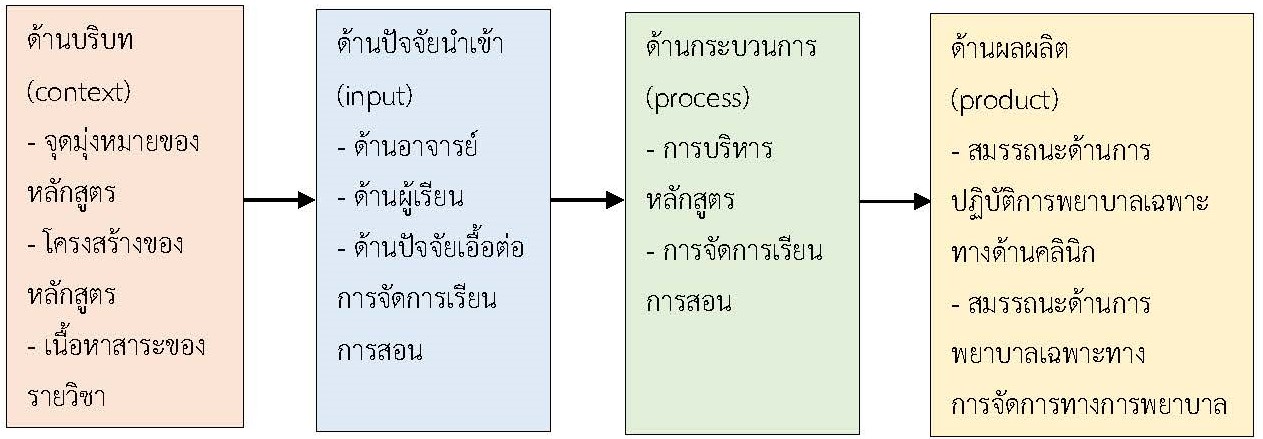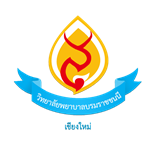The Evaluation on the Training Program Curriculum in Nursing Specialization in Child and Adolescent Mental Health and Psychiatric Nursing
Keywords:
Curriculum Evaluation, Specialized Nursing Curriculum, Psychiatric Nursing, Children and Adolescents, CIPP ModelAbstract
The objective of this evaluative research is to assess the context, inputs, processes, and outcomes of the specialized nursing curriculum in Child and Adolescent Mental Health and Psychiatric Nursing, generations 1-4, based on the CIPP Model. Participants includeed 14 administrators and instructors, 74 training completers, and 26 stakeholders. Quantitative data was collected using a curriculum assessment questionnaire encompassing contextual information, input factors, process aspects, and outcome dimensions. Quantitative data was analyzed using inferential statistics, frequency distribution, percentages, mean values, and standard deviations.
The results showed that the overall curriculum evaluation was at a high level (Mean = 4.45, S.D. = 0.56), with the highest-rated aspect being the process dimension (Mean = 4.49, S.D. = 0.58), followed by the input factors (Mean = 4.45, S.D. = 0.56), outcomes (Mean = 4.29, S.D. = 0.60), and context (Mean = 4.14, S.D. = 0.41), respectively. These research findings serve as guidelines for curriculum development and improvement, aiming to modernize the curriculum, emphasize support for learning innovations, and promote students' clinical nursing competency and nursing management skills in mental health and psychiatric care for children and adolescents. Continuous monitoring and evaluation of the curriculum's outcomes are necessary to assess the long-term impacts and effectiveness of the curriculum.
References
กรมสุขภาพจิต. (2562). 5 อันดับปัญหาเด็กไทย. สืบค้นเมื่อ 20 กุมภาพันธ์ 2564 จากhttps://www.dmh.go.th/news dmh/view.asp?id=29898.
กรมสุขภาพจิต. (2564). ปัญหาสุขภาพจิตในเด็กและวัยรุ่นไทย. สืบค้นเมื่อ 20 กุมภาพันธ์ 2564 จากhttps://www.hfocus.org/content/2021/10/23307.
กรมสุขภาพจิต. (2566). แผนปฏิบัติราชการระยะ 5 ปี (พ.ศ.2566-2570) ของกรมสุขภาพจิต. กองยุทธศาสตร์และแผนงาน กรมสุขภาพจิต กระทรวงสาธารณสุข. นนทบุรี.
พันธุ์นภา กิตติรัตนไพบูลย์ และคณะ. (2560). รายงานการศึกษาเรื่อง ความชุกของโรคจิตเวชและปัญหาสุขภาพจิต: การสำรวจระบาดวิทยาสุขภาพจิตคนไทยระดับชาติ ปี พ.ศ. 2556. นนทบุรี: บียอนด์พับลิสซิ่ง จำกัด.
ระบบคลังข้อมูลด้านการแพทย์ (Health Data Center [HDC]). (2566). การวินิจฉัยมีความผิดปกติทางจิตและพฤติกรรมจำแนกตามอายุ ในเขตสุขภาพที่ 1. ศูนย์เทคโนโลยีสารสนเทศและการสื่อสาร สำนักงานปลัดกระทรวงสาธารณสุข และกลุ่มระบาดวิทยาสุขภาพจิต สำนักวิชาการสุขภาพจิต กรมสุขภาพจิต.
รุ่งรัตน์ สุขเดชะ และกัลยา ไผ่เกาะ. (2564). การประเมินหลักสูตรพยาบาลศาสตรบัณฑิต ฉบับปรับปรุง พ.ศ. 2560 มหาวิทยาลัยวงษ์ชวลิตกุล, วารสารมหาวิทยาลัยวงษ์ชวลิตกุล, 34(1), 47-59.
ศรีเกียรติ อนันต์สวัสดิ์, ศรัญญา จุฬารี และฉวีวรรณ เศียรอุ่น. (2561). ประเมินหลักสูตรพยาบาลศาสตรบัณฑิต มหาวิทยาลัยเทคโนโลยีสุรนารี. นครราชสีมา: สำนักวิชาพยาบาลศาสตร์ มหาวิทยาลัยเทคโนโลยีสุรนารี.
ศิริชัย กาญจนวาสี. (2562). ทฤษฎีการประเมิน (พิมพ์ครั้งที่ 9). กรุงเทพฯ: สำนักพิมพ์แห่งจุฬาลงกรณ์มหาวิทยาลัย.
สถาบันพัฒนาการเด็กราชนครินทร์. (2565). สถิติผู้รับบริการสถาบันพัฒนาการเด็กราชนครินทร์ ปีงบประมาณ 2563-2565. เชียงใหม่: สถาบันพัฒนาการเด็กราชนครินทร์.
หอผู้ป่วยจิตเวชเด็กและวัยรุ่น. (2565). สถิติผู้รับบริการหอผู้ป่วยจิตเวชเด็กและวัยรุ่น ปีงบประมาณ 2563-2565. เชียงใหม่: สถาบันพัฒนาการเด็กราชนครินทร์.
อุษณีย์ เทพวรชัย, กัญญา ชื่นอารมณ์, สมหมาย หิรัญนุช และอัณธิฌา สายบุญศรี. (2561). การประเมินหลักสูตรพยาบาลศาสตรบัณฑิต (หลักสูตรปรับปรุง พ.ศ. 2555). วารสารวิชาการมหาวิทยาลัยปทุมธานี, 10(2), 144-151.
Smith, S., Ferguson, C., & Beaver, K. (2018). A longitudinal analysis of shooter games and their relationship with conduct disorder and self-reported delinquency. International Journal of Law and Psychiatry, 58, 48-53. https://doi.org/10.1016/j.ijlp.2018.02.008
Srinath, S., Kandasamy, P., & Golhar, T. S. (2010). Epidemiology of child and adolescent mental health disorders in Asia. Current Opinion in Psychiatry, 23(4), 330-336. https://doi.org/10.1097/yco.0b013e32833aa0c1
Stufflebeam, D.L. (2003). The CIPP model for evaluation, in T. Kellaghan and D.L Stuffelebeam (eds) (pp. 31 -62), International Handbook of Educational Evaluation. Netherland: Kluwer Academic Publishers.

Downloads
Published
How to Cite
Issue
Section
License
Copyright (c) 2023 Journal of Nursing and Public Health Research

This work is licensed under a Creative Commons Attribution-NonCommercial-NoDerivatives 4.0 International License.
1. บทความหรือข้อคิดเห็นใด ๆ ที่ปรากฏในวารสารวิจัยการพยาบาลและการสาธารณสุข ที่เป็นวรรณกรรมของผู้เขียน บรรณาธิการไม่จำเป็นต้องเห็นด้วย
2. บทความที่ได้รับการตีพิมพ์ถือเป็นลิขสิทธิ์ของ วารสารวิจัยการพยาบาลและการสาธารณสุข








